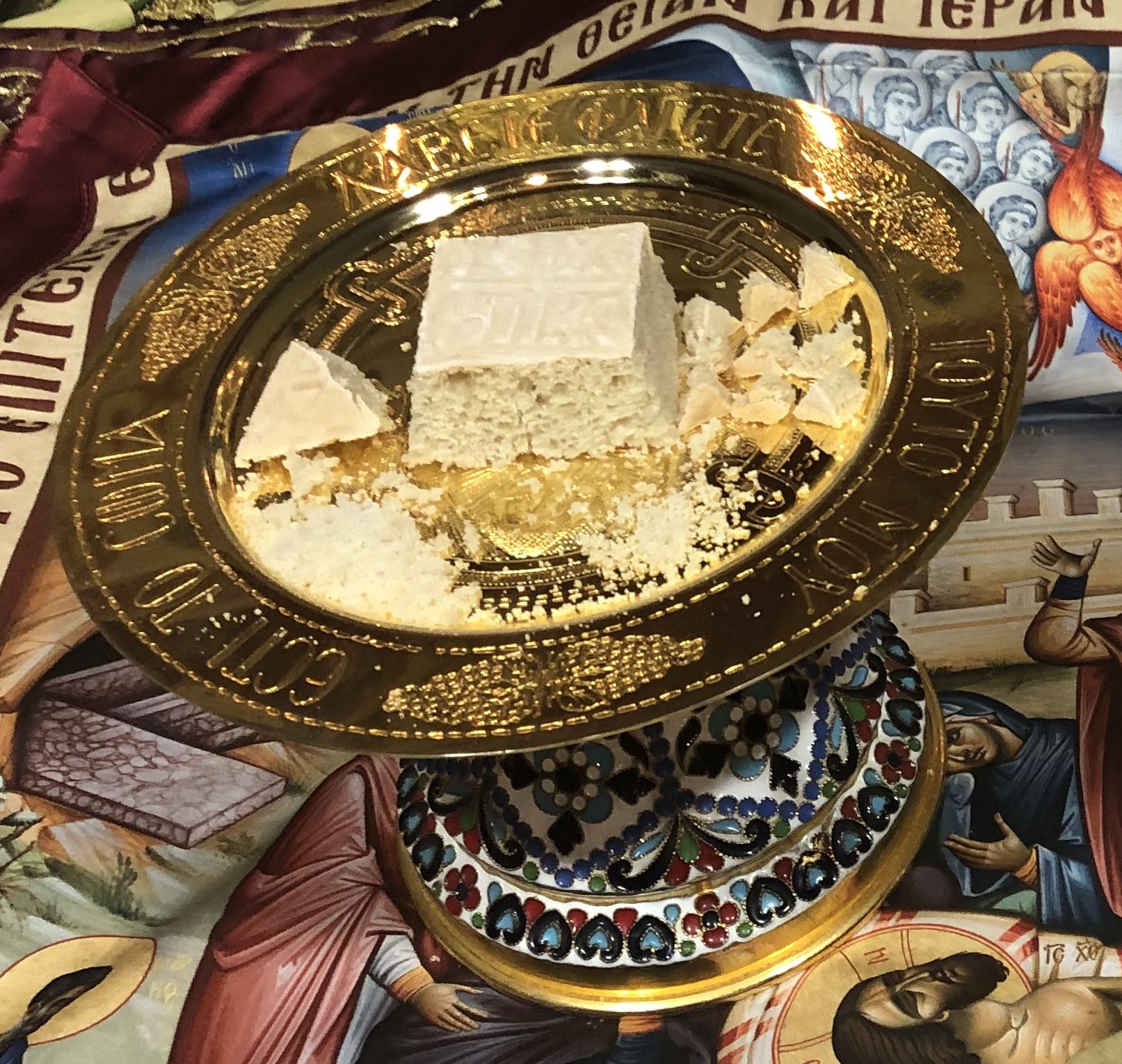The memory of the righteous is a blessing.
Proverbs 10:7
Precious in the sight of the Lord is the death of His saints.
Psalm 116:15
After the first three stasis, or stanzas of Psalm 119, the funeral service continues with the “Evlogitaria,” a set of hymns that begins with a verse “Blessed are You, O Lord, teach me Your commandments.” These may sound familiar as they are part of the memorial services we hear so often. The first three of these hymns are also written in the first person. We sing these on behalf of the deceased, and in anticipation of our own exit from this life. The words are appropriate both for the one who has passed, and for us who remain to ponder. A couple of quotes:
I am the lost sheep: O Savior, call me back and save me.
Lead me back again to Your likeness, so that the ancient beauty may be refashioned.
Grant me the desired homeland for which I long, making me again a citizen of Paradise.
(From the Digital Chant Stand of the Greek Orthodox Archdiocese, https://dcs.goarch.org, from Sacraments and Blessings, Funeral, PDF text in English, pages 2-3)
The fourth hymn moves to the third person, referring specifically to the deceased, asking God to “place him/her in Paradise where the choirs of the Saints and the righteous, O Lord, will shine as the stars of heaven.” (p. 3) The hymnographer uses such vivid imagery. To shine like a star in heaven is a comforting thought. I have always described the stars as majestic, and to be part of God’s majesty is such a comforting thought, especially for a family left behind, i.e. that my loved one is sharing in God’s majesty.
The next hymns return to the plural, asking God to “illumine us who worship You in faith and deliver us from the eternal fire.” (p. 3) The sixth and final hymn of this set, is addressed to the Theotokos, asking “Through you, pure and blessed Theotokos, may we find Paradise.” (p. 3) While it is the Lord who will ultimately grant us admission to Paradise, we have the Theotokos (Virgin Mary) as both example and intercessor on our behalf.
One of the more well-known hymns of the funeral/memorial service follows, as we sing “With the Saints, give rest, O Christ, to the soul of Your servant where there is no pain, no sorrow, no sighing, but life everlasting.” (p. 3) Traditionally the priest will offer incense over the body of the deceased at this point. There are several takeaways from this hymn.
First, there is a connection between us and the Saints. The word for “saint” in Greek is “Agios,” which can be translated “set apart.” A saint is someone whose life was distinguished because it was set apart for God. In this instance, we are also praying that God will set our loved one aside in the ranks of the saints, all those who have pleased God, who have been deemed worthy by God to enter into His heavenly Kingdom.
The word “Agios” (or “Agia” for female) is the title put in front of a saint’s name. For instance, St. Nicholas in Greek is “Agios Nikolaos,” and St. Katherine is “Agia Ekaterini.” “Agios/Agia” can also be translated as “Holy.” Thus, the name of each saint is “Holy Nicholas,” or “Holy Katherine.” As we chant this hymn, we pray that the title “holy” is now conferred upon our deceased loved one, that they have taken their place together with all of God’s saints. We are also praying that our loved one has earned this title, that they are considered “holy” by our Lord. I have mentioned at many funerals that we will all one day be the “guest of honor,” at a funeral. One day each of us will have our own funeral. We pray that at that time, God will deem us worthy also of the title “holy,” which should be something that drives us and motivates us. On the topic of the word “guest,” a friend of mine, when talking about our lifespan, once said to me “we are all guests,” meaning that we are all just passing through this life. It is temporary for all of us. A guest in a home is someone who is there one day and not there the next. The owner is the one who stays permanently. None of us is permanent, we are all guests of God in this life. A funeral is a great reminder of that.
The last takeaway from this hymn is a glimpse of heaven. We will be discussing this further as we finish this unit. For now, the hymnographer gives us three descriptions of life in heaven—no pain, no sorrow, no sighing—in other words, no suffering, no sadness, and no regret. Rather, there is life everlasting. Remember that earlier in this unit, we discussed “life” as being with God and death a state of being absent from God. This hymn prays that we will have “life” with God and have it forever.
With my whole heart I cry; answer me, O Lord! I will keep Thy statutes. I cry to Thee; save me, that I may observe Thy testimonies. I rise before dawn and cry for help; I hope in Thy words. My eyes are awake before the watches of the night, that I may meditate upon Thy promise. Hear my voice in thy steadfast love; O Lord, in Thy justice preserve my life. They draw near who persecute me with evil purpose; they are far from Thy law. But Thou art near, O Lord, and all Thy commandments are true. Long have I known from Thy testimonies that Thou hast founded them forever. Psalm 119:145-152
The hymns of the funeral give us comfort when thinking about our deceased loved ones and also gives us something to aim for as far as our own lives.

